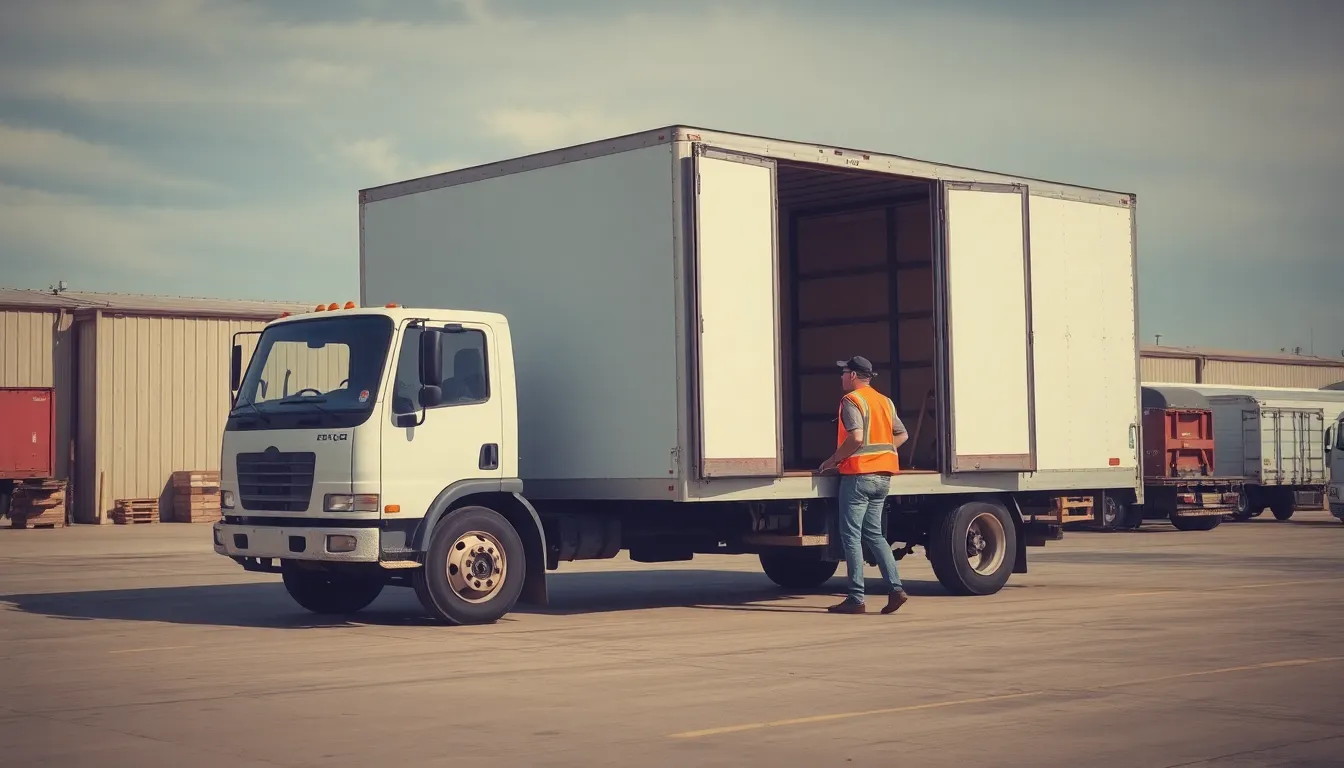In the ever-evolving world of logistics, box truck owner operator jobs are the unsung heroes of the freight industry. Picture this: you’re the captain of your own ship, navigating the highways and byways while delivering goods that keep the economy rolling. It’s like being a superhero, but instead of a cape, you’ve got a sturdy box truck and a knack for navigating traffic.
Table of Contents
ToggleOverview of Box Truck Owner Operator Jobs
Box truck owner operators play a vital role in the logistics and freight industry. They manage their own businesses, navigating the challenges of transporting goods efficiently.
Definition and Scope
Box truck owner operators utilize medium-duty trucks for transporting freight. Generally, these operators own their vehicles, allowing them to operate independently. Many engage with diverse industries, including retail, manufacturing, and e-commerce. Responsibilities encompass loading and unloading cargo, maintaining compliance with regulations, and managing delivery schedules. Tasks range from negotiating contracts to maintaining equipment, emphasizing the multifaceted nature of their role.
Importance in the Logistics Industry
Box truck owner operators contribute significantly to supply chains. They provide flexibility and speed, addressing urgent delivery needs. Many businesses rely on their services to ensure timely deliveries. The presence of owner operators enhances competition, leading to better pricing and service options. Economic implications abound, as these operators support local economies by facilitating commerce. The loss of goods during transport poses a challenge, but well-managed operations minimize such risks, ensuring a steady flow of products.
Requirements for Box Truck Owner Operators

Box truck owner operators must meet specific requirements to ensure safety and legal compliance while transporting goods. Understanding these requirements is essential for successful operations.
License and Certifications
A valid commercial driver’s license (CDL) is crucial for operating a box truck. Depending on the truck’s weight and configuration, some states may require a Class B CDL. In addition to a CDL, owner operators must obtain cargo insurance and liability coverage. Completing a transportation or trucking safety course can enhance credibility. Some operators pursue certification in transportation management, which demonstrates professionalism. Compliance with local, state, and federal regulations is vital, including maintaining an active registration with the Department of Transportation (DOT).
Truck Specifications
Box trucks must meet specific criteria for operation. Generally, they should possess a Gross Vehicle Weight Rating (GVWR) of 10,000 to 26,000 pounds. The vehicle’s size often ranges from 10 to 26 feet in length, providing ample space for various cargo types. Capable of handling diverse loads, box trucks typically feature a liftgate or ramp for easy loading and unloading. Maintenance of equipment is essential, including regular inspections of the engine, brakes, and tires. Ensuring compliance with emission standards and other regulations keeps operations smooth and legal.
Pros and Cons of Box Truck Owner Operator Jobs
Box truck owner operator jobs present both opportunities and challenges. Examining these aspects helps potential operators understand the landscape of this profession.
Advantages
Flexibility stands out among the advantages of box truck owner operator jobs. Operators set their own schedules and choose routes, allowing for a better work-life balance. Independence comes with managing a personal business, which brings a sense of ownership and control. Potential earnings also attract individuals; depending on the market and efficiency, income can significantly exceed traditional employment. The growing demand for delivery services, particularly in e-commerce and retail, offers increased job stability. Operators directly contribute to the economy, an appealing aspect for those seeking meaningful work.
Disadvantages
Challenges frequently accompany the benefits of box truck owner operator jobs. Expenses for fuel, maintenance, and insurance can accumulate, impacting profit margins. Responsibilities also extend to navigating complex regulations; ensuring compliance takes time and effort. The risk of cargo damage during transit poses another concern, making careful handling essential. Long hours on the road can lead to fatigue, affecting both health and safety. Finally, income variability can create uncertainty; slower periods may result in financial strain.
Finding Box Truck Owner Operator Jobs
Searching for box truck owner operator jobs requires targeted strategies. Utilizing the right resources can lead to lucrative opportunities.
Online Job Boards
Online job boards offer a vast array of listings for box truck owner operator positions. Popular platforms like Indeed, Monster, and ZipRecruiter regularly feature ads for owner operators seeking work. Job seekers can tailor searches using keywords specific to their niche, such as “box truck” or “freight delivery.” Creating profiles on these platforms also enables operators to receive alerts for new postings. Consistent monitoring of these sites increases the chances of finding suitable jobs quickly.
Networking Opportunities
Networking within the industry proves invaluable for securing box truck owner operator jobs. Building connections with freight brokers, logistics companies, and fellow truck drivers expands the potential for job leads. Attending industry events, trade shows, or local meetups provides a chance to make important contacts. Engaging on professional social media platforms like LinkedIn helps in showcasing skills and experiences to prospective employers. Many job opportunities arise from referrals, so maintaining strong relationships within the community enhances visibility and accessibility in the job market.
Income Potential and Expenses
Income potential for box truck owner operators varies based on several factors. Experience level, geographic area, and type of cargo influence earnings. On average, operators earn between $40,000 to $120,000 annually. Successful operators often report higher earnings due to diversified contracts and freight loads. Annual earnings depend on operational efficiency and service quality.
Average Earnings
Average earnings fluctuate significantly based on market demand. Rates for box truck loads range from $1.50 to $3.00 per mile. Operators specializing in specific niches or urgent deliveries can command premium rates. Seasonal demands also affect pricing, with peaks during holidays increasing income opportunities. Many owner operators supplement income through dedicated contracts or partnering with logistics companies. Flexibility in routes often leads to better earnings, allowing operators to choose high-paying jobs.
Cost of Ownership
Costs associated with ownership significantly impact profitability for box truck operators. Monthly expenses typically include truck payments, insurance, and maintenance. Insurance costs can range from $1,000 to $3,000 per year, depending on coverage levels and driving history. Fuel expenses are another major consideration, as fuel prices vary widely. Regular maintenance ensures operational efficiency, averaging about 10% of total earnings annually. Toll costs and permits can further add to total expenses, illustrating the need for careful financial planning.
Box truck owner operator jobs present a unique opportunity for those seeking independence and flexibility in the logistics industry. With the growing demand for efficient delivery services, these operators play a vital role in keeping the economy moving. While challenges exist, effective management and strategic planning can lead to significant rewards. By understanding the requirements and navigating the complexities of the profession, aspiring owner operators can carve out a successful career. The journey may be demanding but for those who thrive on autonomy and responsibility, it’s a path worth exploring.


